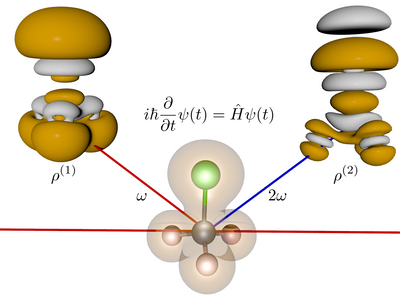Hamiltonoperatorer, Pauliprincipen, Born–Oppenheimerapproximationen, potentialytor, elektronstrukturteori, vågfunktioner, elektrontätheter, molekylorbitaler, Slaterdeterminanter, Hartree–Fock, orbitalenergi och Koopmans teorem, gruppteori och symmetri, spinn för flerelektronsystem, elektronkorrelation, konfigurationsväxelverkan, Møller–Plesset störningsteori.
CB2070 Molekylär kvantmekanik 7,5 hp

Kursen syftar till att ge en samling grundläggande kunskaper och introducera ett urval av verktyg som krävs för att kunna ta sig an kvantmekaniska beräkningar på molekylär nivå. Den riktar sig till studenter inom fysik och tillämpad matematik, samt matematiskt och fysikaliskt intresserade kemister. Den vänder sig i första hand till studenter med en grundläggande förståelse för kvantmekanik.
Information per kursomgång
Välj termin och kursomgång för att se aktuell information och mer om kursen, såsom kursplan, studieperiod och anmälningsinformation.
Information för VT 2026 Start 2026-01-13 programstuderande
- Studielokalisering
AlbaNova
- Varaktighet
- 2026-01-13 - 2026-03-13
- Perioder
VT 2026: P3 (7.5 hp)
- Studietakt
50%
- Anmälningskod
61562
- Undervisningsform
Normal Dagtid
- Undervisningsspråk
Engelska
- Kurs-PM
- Kurs-PM är inte publicerat
- Antal platser
Ingen platsbegränsning
- Målgrupp
- Ingen information tillagd
- Planerade schemamoduler
- [object Object]
- Schema
- Del av program
Kontakt
Kursplan som PDF
Notera: all information från kursplanen visas i tillgängligt format på denna sida.
Kursplan CB2070 (HT 2021–)Innehåll och lärandemål
Kursinnehåll
Lärandemål
Kursens syftar till att ge en samling grundläggande kunskaper och introducera ett urval av verktyg som krävs för att kunna ta sig an kvantmekaniska beräkningar på molekylär nivå. Den riktar sig till studenter inom fysik och tillämpad matematik, samt matematiskt och fysikaliskt intresserade kemister. Den vänder sig i första hand till studenter med en grundläggande förståelse för kvantmekanik.
Efter fullgjord kurs skall du kunna:
- utforma och bruka vågfunktioner och operatorer för flerelektronsystem
- karakterisera symmetri hos vågfunktioner och därmed förstå spektroskopiska urvalsregler
- förklara starka kovalenta bindningar i termer av vågfunktioner
- förklara elektroners korrelerade rörelser
- utföra beräkningar av approximativa vågfunktioner med hjälp av datorer
Kurslitteratur och förberedelser
Särskild behörighet
Avklarad kurs i kvantmekanik
Kurslitteratur
Examination och slutförande
Betygsskala
Examination
- TEN1 - Skriftlig tentamen, 5,0 hp, betygsskala: A, B, C, D, E, FX, F
- LAB1 - Laborationsrapporter, 2,5 hp, betygsskala: P, F
Examinator beslutar, baserat på rekommendation från KTH:s handläggare av stöd till studenter med funktionsnedsättning, om eventuell anpassad examination för studenter med dokumenterad, varaktig funktionsnedsättning.
Examinator får medge annan examinationsform vid omexamination av enstaka studenter.
När kurs inte längre ges har student möjlighet att examineras under ytterligare två läsår.
Examinatorn tar efter konsultation med KTH Funka beslut om anpassade examination för studenter med dokumenterad funktionsnedsättning.
Vid grupparbete har alla i gruppen ett gemensamt ansvar för arbetet.
Labrapporter kan kompletteras.
Examinator
Etiskt förhållningssätt
- Vid grupparbete har alla i gruppen ansvar för gruppens arbete.
- Vid examination ska varje student ärligt redovisa hjälp som erhållits och källor som använts.
- Vid muntlig examination ska varje student kunna redogöra för hela uppgiften och hela lösningen.